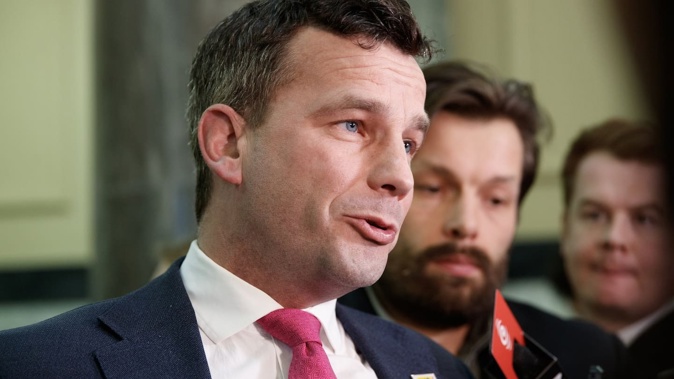
Associate Education Minister David Seymour says there have been 78 applications to open new or convert existing state schools into charter schools.
He described the demand as “overwhelming” and acknowledged some applicants would be left disappointed as the $153 million in funding in Budget 2024 would allow for only 15 new charter schools and the conversion of 35 state schools to charter schools in the next two years.
At a press conference in Auckland this afternoon, Seymour said 10 of the 78 applications were state schools that would like to switch over.
He said interest was “huge” and could come from the community, iwi, and businesses.
Act leader David Seymour. Photo / Mark Mitchell
“The education sector is facing several challenges, particularly regarding attendance and achievement. The ‘one size fits all’ model offered by the current school system struggles to address these challenges,” Seymour said.
“Due to demand outstripping the funding made available in Budget 24, I acknowledge some sponsors will be disappointed when final decisions are made by the CSA (Charter Schools Agency).”
Seymour said there had been “really strong interest” from Māori, as well as from people in sport.
There was “really quite a wide range” of interest, he said.
He was not yet sure if any interest had been expressed from religious entities.
Education was not engaging people as it should, the Act leader said.
On the pushback from unions, Seymour said he has had some engagement with them and described the charter school pay processes as an “existential” threat to unions.
Seymour said stage two of the application process would be undertaken over the coming months before final decisions were made later in the year.
“The second stage is a detailed assessment of sponsors’ plans for the school before final decisions are made later this year.
“This will evaluate the focus of the proposed school, the capability of the sponsor, the standard of tuition to be provided, the level of support from the community, and financial and network implications for the Crown.”
The first charter contracts would be negotiated and signed before the end of the year and the first schools were expected to open for term one 2025.
Charter schools operated in New Zealand between 2014 and 2018. They were a long-standing Act Party policy when Act was a support party for the National Government.
However, they were abolished in 2018 by the previous Labour coalition Government. Charter schools at the time could transition into character schools, which are entirely government-funded for years 0-13 and teach the national curriculum that aligns with their “character”, such as an iwi or educational philosophy.
The first new wave of charter schools was expected to have about 200 students each over the next two years across 50 school sites. As the Herald reported on Thursday, Ministry of Education had warned careful planning would be needed over curriculum regulation and governance, as previous experience showed many charter schools were started by small organisations that lacked money and business experience.
Seymour says charter schools gave educators greater autonomy, created diversity in the country’s education system and raised overall educational achievement, especially for students who are underachieving or disengaged from the current system.
“Charter schools will be subject to a high level of monitoring and accountability and could be shut down if they do not achieve the outcomes they were funded to achieve.”
Julia Gabel is a Wellington-based political reporter. She joined the Herald in 2020 and has most recently focused on data journalism.
Take your Radio, Podcasts and Music with you









